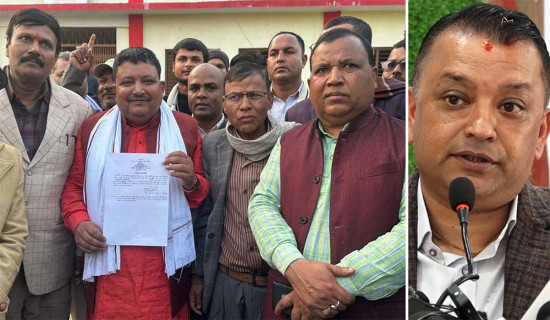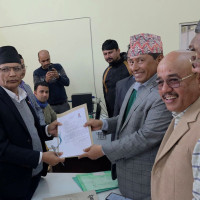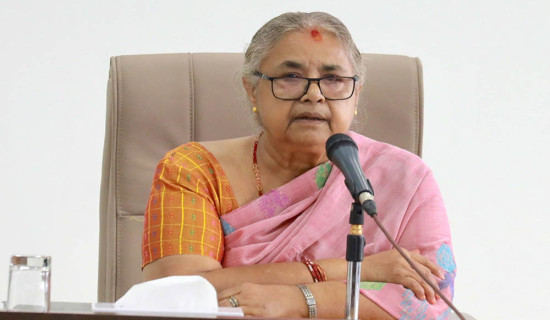- Wednesday, 21 January 2026
Capacity Development For Local Government
Capability is the combination of a person's or a group’s knowledge, skills, mindsets, and competence as a whole that enables them to perform their tasks successfully. At the local level, Capacity Development (CD) ensures that government institutions and entities function effectively.
It aims to enhance their capability for proper execution of tasks. It includes the capacity to detect issues, analyse alternative options to cope with problems, make sound policies, and sustain these efforts to execute them for the benefit of socio-economic development. The United Nations Development Assistance Framework (UNDAF) defines enhancing capacities at three interconnected levels, namely, capacity at the individual level, capacity at the institutional level, and capacity at the enabling environment.
Capacity building at the individual level refers to the strengthening and unleashing of the knowledge, skills, proficiency, and competency of human resources. Similarly, organisational capacity building refers to enhancing managerial performance through improvements in systems, functions, plans, policies, strategies, guidelines, structures, leadership, and other dynamics. Lastly, capacity building in an enabling situation refers to the creation of a conducive environment where institutions and human resources operate.
CD at local level
Following the restoration of the multiparty democratic system, the local bodies commenced service delivery under specific legal frameworks, including the Local Self-Governance Act 1999, the Local Self-Governance Regulation LSGR 1999, and the Local Body (Financial Administration) Regulations 2007. The Ministry of Federal Affairs and Local Development (MoFALD) implemented several capacity development programmes, including the Local Governance and Community Development Programme (LGCDP) I from 2008 to 2013 and LGCDP II from 2013 to 2017. These programmes aimed to improve governance and community development by addressing poverty reduction.
Output 5 of the LGCDP II focused on capacity development (CD). The capacity development strategy for the LGCDP II formulated in 2014 focused on three major interrelated sectors, including individual human resource development (HRD), organisational development, and systems and network development. The capacity development strategy for the LGCDP II outlined five primary entry points to realise anticipated results during the programme's duration, including the Ministry of Federal Affairs and Local Development (MoFALD) with its affiliated entities, the Local Development Training Academy (LTDA) and Rural Development Training Centres (RDTC), Local Bodies' Associations (LBAs) and Local Bodies (LBs), Social Mobilisers as an independent entity, and Service Providers (both national and local).
With the adoption of federalism in Nepal, the constitution has devolved power, authority, and responsibilities to local governments. The Local Governance Operation Act 2017 has defined the roles and functions of local levels, emphasising participatory planning processes for budgetary allocations and policy guidelines. Thus, a competent, capable, and effective local government and institutions have become the prerequisites for good governance.
To build the capacity of provincial and local governments, the government of Nepal launched the Provincial and Local Governance Support Programme (PLGSP) in 2019. The Ministry of Federal Affairs and General Administration (MOFAGFA) has formulated and implemented Innovative Local Economic Development (ILED) Procedures 2080 to foster local economic development. Moreover, 104 local levels from the seven provinces have been eligible after fulfilling the selected criteria to conduct the ILED programme for the fiscal year 2080–81 B.S.
Assessment of CD
The Local Governance Capacity Need Assessment Report 2078 reveals that 73 per cent of the local levels don't have provision for landfill sites for waste management. About 29 per cent have formulated and implemented local periodic plans, and only 15 per cent have established project banks. About 57 per cent have not done IEE/EIA while constructing infrastructure, and 31 per cent have implemented non-eco-friendly approaches. The percentage of locals with access to information technology has reached 83 per cent. About 40 per cent have conducted public-private partnership dialogues.
The report reveals that 91 per cent are still lagging in the formulation of the capacity development plan. The report on Capacity Needs Assessment for the Transition to Federalism of Nepal 2019 has exhibited widespread capacity gaps in physical infrastructure, human resource management, public financial management, gender equality and social inclusion (GESI), and accountability and transparency. Moreover, significant disparities exist in physical infrastructure among local governments, particularly in building ownership, with over half relying on rented spaces. This poses a potential obstacle to efficient public service delivery, especially in rural areas facing challenges in power, internet, and communication access.
Significant delays have been observed in the development of crucial legal frameworks, such as the Federal Civil Service Bills, Police Management Bills, and sectoral laws on concurrent powers. Gender Equality and Social Inclusion (GESI) activities encounter challenges because of inadequate mechanisms within programmatic local governments (PLGs).
The clarity of local government revenue mobilisation and fiscal capacity is hindered by the uncertain expenditure needs of PLGs and insufficient infrastructure funding. The majority of PLGs still rely on outdated paper-based asset inventory systems, lack robust monitoring and evaluation mechanisms, and face challenges in performance management.
The inadequacy of a skilled and proficient workforce, the absence of written job descriptions, and organisational policies for human resource management have been challenging. Local financial management is advancing with software systems, highlighting a need for capacity building. Moreover, this necessitates the standardisation of public financial management (PFM) software and the extension of PFM practices to provincial and local governments.
Global approach
According to The Confluence, 2023, 70.3 per cent of rural households in Bangladesh don't have access to the internet. However, the Government of Bangladesh has already made efforts to equip rural areas with digital infrastructure to digitise services and eliminate bureaucratic red tape. About 4,501 Union Digital Centres (UDCs) were opened throughout the country in 2010, which escalated to 8,280 in 2021. These serve as local-level digital service centres established at the union level (the smallest rural administrative unit in Bangladesh), serving the rural population and mitigating the risk of the digital divide. UDCs aim to contribute to digital literacy and the empowerment of rural communities by increasing access to online services, educational and skill development opportunities, and information.
Indonesia has adopted legislation called the Village Law (2015–2018) as a significant effort for decentralisation of power and inclusive governance. This initiative is concerned with granting more authority over development plans and budgets and enhancing participatory decision-making in rural villages. The law ensures that the central government allocates a designated fund to the 74,093 villages in Indonesia to independently finance the development project based on their needs and priorities. The objective is to empower local communities by providing high-level autonomy and participatory decision-making authority to the villages. The village law promotes community development with various infrastructure projects, including education, healthcare, agriculture, and well-being.
Ways for sustainability
Local governments should assess capacity needs, considering diverse geographic and demographic landscapes like Kathmandu Valley and remote areas. Provincial and federal governments should provide expertise, technology transfer, and knowledge sharing to support local capacity development. The national CD plan should adopt a bottom-up approach, addressing the unique demands of each locality for inclusive and responsive local development.
Human resources need improved skills in governance, programme management, leadership, and performance-based management. Local governments and provincial good governance centres should offer career development and mentorship programs. Individuals should pursue innovative learning through training and workshops. Cultivating a knowledge-sharing culture, leveraging technology for education, and recognising individual achievements are crucial for enhancing capacity development.
Tailored approaches are needed for capacity development, considering diverse state, economic, and societal realities. Policy coherence and coordination are crucial, discouraging fragmented approaches among development partners. The LGCDP II's CD Strategy emphasises restructuring the Local Development Training Academy (LDTA), ensuring transparent leadership recruitment, and predetermined Terms of Reference. Collaborative efforts with academia, civil society organisations, and institutions like LDTA as knowledge centres on good governance are essential.
(The author is an under-secretary at the Ministry of Federal Affairs and General Administration)





-square-thumb.jpg)
-original-thumb.jpg)








